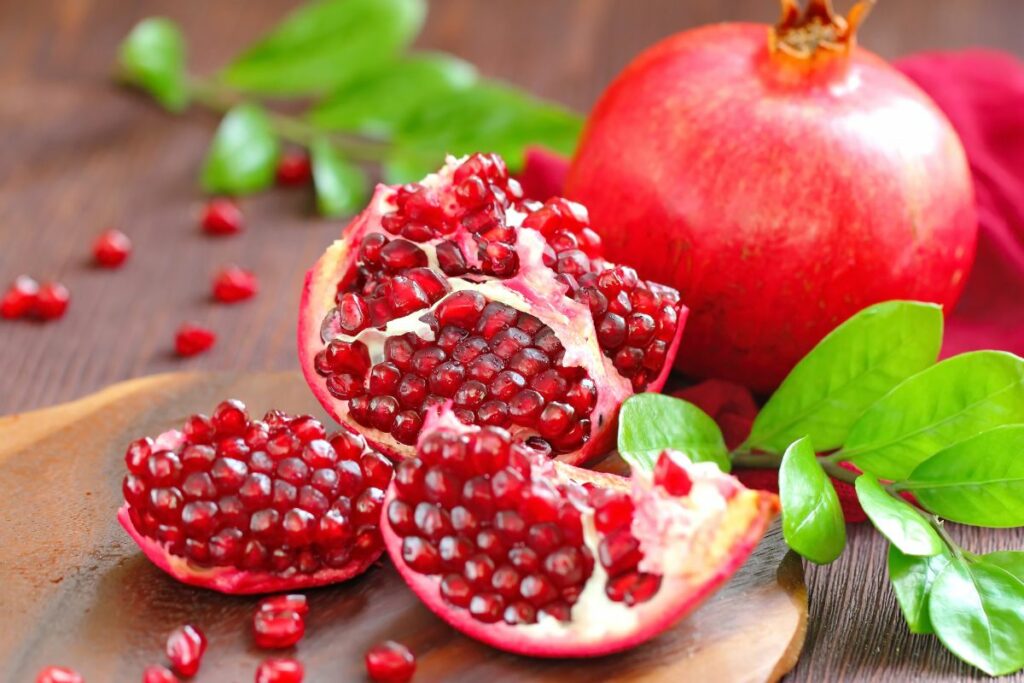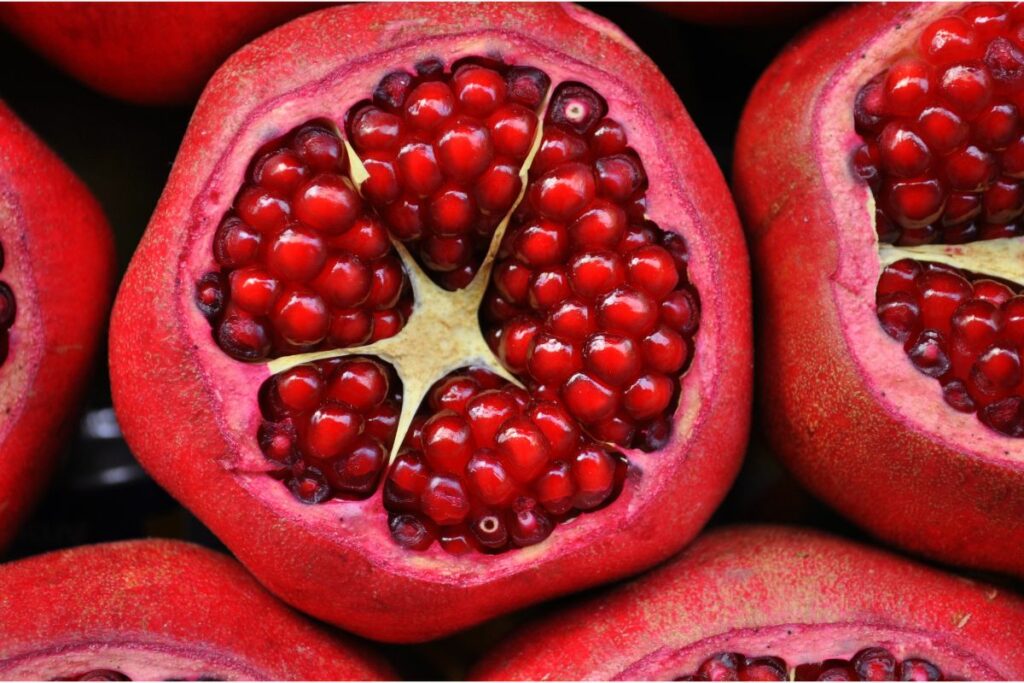Pomegranate is a unique and flavorful fruit that has been enjoyed for thousands of years. Native to the Middle East and Mediterranean region, pomegranate has long been valued for its health benefits and culinary versatility.
The fruit’s distinctive taste, juicy seeds, and vibrant red color make it a popular ingredient in a variety of dishes, from salads to cocktails.

Beyond its delicious taste, pomegranate is also a nutritional powerhouse, packed with vitamins, minerals, and antioxidants.
In fact, pomegranate has been touted as a superfood due to its numerous health benefits. Research has shown that the antioxidants in pomegranate can improve heart health, reduce inflammation, and even help prevent certain types of cancer.
In this article, we will explore the unique taste and ingredients of pomegranate and its powerful health benefits. We will dive into the nutritional value of the fruit and examine the many ways it can benefit your overall health and well-being.
We will also provide tips on how to incorporate pomegranate into your diet, from adding it to smoothies to using it as a garnish for your favorite dishes.
Whether you are a longtime fan of pomegranates or are just discovering this delicious fruit, this article will provide you with all the information you need to fully appreciate the taste, ingredients, and health benefits of pomegranates.
What Does Pomegranate Taste Like?
The taste of pomegranate is often described as both sweet and tart, with a refreshing and slightly astringent quality.
The fruit itself is covered in thick, leathery skin, and inside, it contains numerous small, juicy seeds that are surrounded by a pulpy membrane. The seeds are the edible part of the fruit and have a crunchy texture and a slightly sour flavor.
When you bite into a pomegranate seed, you will experience a burst of sweet and tangy juice, which is both refreshing and delicious.
Some people also describe the taste of pomegranate as having hints of floral and earthy notes, making it a unique and flavorful addition to a variety of dishes.
Overall, the taste of pomegranate can be quite versatile, depending on how it is prepared and what it is paired with.
Some people enjoy eating the seeds on their own, while others like to use them as a topping for salads, yogurt, or ice cream. Pomegranate juice is also a popular ingredient in cocktails and smoothies, adding a sweet and tangy kick to any drink.
Pomegranate Ingredients
Pomegranate is a nutrient-dense fruit that is rich in a variety of vitamins, minerals, and antioxidants. Here are some of the key ingredients found in pomegranates:
- Vitamin C: Pomegranate is an excellent source of vitamin C, which plays a vital role in supporting the immune system and promoting healthy skin.
- Potassium: Pomegranate is also a good source of potassium, which is essential for maintaining healthy blood pressure levels and supporting heart health.
- Fiber: Pomegranate contains both soluble and insoluble fiber, which can help regulate digestion, promote satiety, and reduce the risk of certain diseases.
- Antioxidants: Pomegranate is packed with powerful antioxidants, such as punicalagin and ellagic acid, which help protect against oxidative stress and inflammation in the body.
- Polyphenols: Pomegranate is rich in polyphenols, which are plant-based compounds that have been shown to have numerous health benefits, including reducing the risk of chronic diseases like heart disease, diabetes, and cancer.
- Vitamin K: Pomegranate is a good source of vitamin K, which plays a role in blood clotting and bone health.
The unique combination of vitamins, minerals, fiber, and antioxidants in pomegranate makes it a highly nutritious fruit that can provide a wide range of health benefits.
Health Benefits Of Pomegranate
Pomegranate has long been valued for its powerful health benefits. Here are some of the key ways in which pomegranate can promote overall health and well-being:
- Heart health: Pomegranate has been shown to have a positive effect on heart health by reducing inflammation and improving cholesterol levels. Studies have found that consuming pomegranate juice can improve blood flow to the heart and lower blood pressure, reducing the risk of heart disease.
- Antioxidant activity: Pomegranate is packed with antioxidants, which can help protect against oxidative stress and inflammation in the body. These antioxidants have been shown to have a protective effect against chronic diseases such as cancer, Alzheimer’s, and diabetes.
- Digestive health: The fiber found in pomegranate can help regulate digestion, promoting regularity and reducing the risk of constipation. Pomegranate may also have anti-inflammatory properties that can help reduce symptoms of inflammatory bowel disease (IBD).
- Skin health: Pomegranate contains vitamin C and other antioxidants that can help protect the skin from damage caused by free radicals. It may also help improve skin texture and reduce the appearance of fine lines and wrinkles.
- Anti-cancer properties: Pomegranate has been shown to have anti-cancer properties, particularly in reducing the risk of breast, prostate, and colon cancers. The polyphenols and other antioxidants found in pomegranate may help prevent cancer cell growth and promote cancer cell death.
- Anti-inflammatory properties: Pomegranate has been shown to have anti-inflammatory properties, which can help reduce inflammation throughout the body. This may be particularly beneficial for those with chronic inflammatory conditions such as rheumatoid arthritis.
The powerful combination of vitamins, minerals, fiber, and antioxidants found in pomegranate make it a highly nutritious fruit with a wide range of health benefits.
How To Add Pomegranate To Your Diet

Adding pomegranate to your diet is easy and can be a delicious way to reap the health benefits of this nutritious fruit. Here are some simple ways to incorporate pomegranate into your diet:
- Eat the seeds: The seeds are the edible part of the pomegranate and can be eaten on their own as a snack or used as a topping for salads, yogurt, or oatmeal.
- Make pomegranate juice: You can make fresh pomegranate juice by blending the seeds and then straining out the juice. Pomegranate juice can be used in smoothies, cocktails, or enjoyed on its own.
- Add to dishes: Pomegranate seeds can be used as a colorful and flavorful addition to a variety of dishes, such as roasted vegetables, grain bowls, or stir-fry.
- Make a salsa: Mix pomegranate seeds with diced tomato, red onion, cilantro, and lime juice for a delicious and nutritious salsa.
- Sprinkle on top of desserts: Pomegranate seeds can add a pop of color and flavor to desserts like ice cream or chocolate mousse.
- Brew pomegranate tea: You can brew pomegranate tea by steeping the seeds or using pomegranate tea bags. Pomegranate tea can be enjoyed hot or cold and is a refreshing and healthy beverage option.
Adding pomegranate to your diet is a simple and delicious way to boost your nutrient intake and support overall health and well-being.
Where Can You Buy Pomegranate?
Pomegranates can be found in many grocery stores, health food stores, and farmers’ markets, particularly during their peak season, which is from September to January in the Northern Hemisphere.
Pomegranates are widely available and can be found in many different stores and markets. When buying fresh pomegranates, look for fruits that are heavy for their size and have a deep, vibrant color.
How To Store Pomegranate
Proper storage of pomegranates can help extend their shelf life and maintain their flavor and nutritional value. Here are some tips for storing pomegranates:
- Store at room temperature: Pomegranates can be stored at room temperature for up to a week. Place them in a cool, dry place away from direct sunlight.
- Refrigerate for longer storage: If you want to store pomegranates for longer than a week, you can refrigerate them. Place the pomegranates in a plastic bag and store them in the refrigerator crisper drawer. They can last for up to two months in the refrigerator.
- Freeze for later use: Pomegranate seeds can also be frozen for later use. Simply remove the seeds from the pomegranate and place them in an airtight container or freezer bag. The seeds can be frozen for up to six months.It is important to note that pomegranates can be prone to spoilage if they are damaged or have any cuts or bruises.
Be sure to inspect them carefully before storing and discard any that show signs of spoilage, such as mold or soft spots. By following these storage tips, you can enjoy fresh and delicious pomegranates for longer.
Final Thoughts
Pomegranates are delicious and nutritious fruit with a range of health benefits. From promoting heart health to supporting digestion and improving skin health, the nutrients, and antioxidants found in pomegranate make it a valuable addition to any diet.
With its sweet and tart taste, pomegranate can be enjoyed in many different ways, whether eaten on its own, used as a topping, or incorporated into dishes and beverages.
Whether you are looking to boost your overall health or simply add some variety to your diet, pomegranates are a fantastic choice. So go ahead and give this superfruit a try and experience the many benefits it has to offer.
- How To Reheat A Cheesesteak - November 5, 2023
- What Are Three Must Have Kitchen Knives? - September 22, 2023
- How To Protect Edges Of Pie Crust - June 15, 2023








